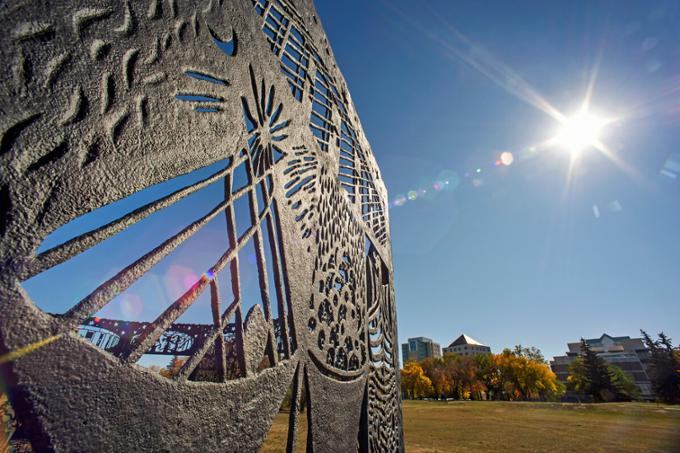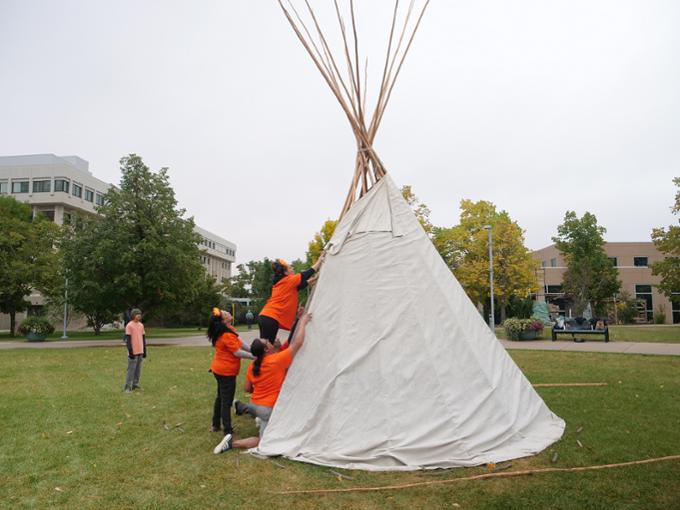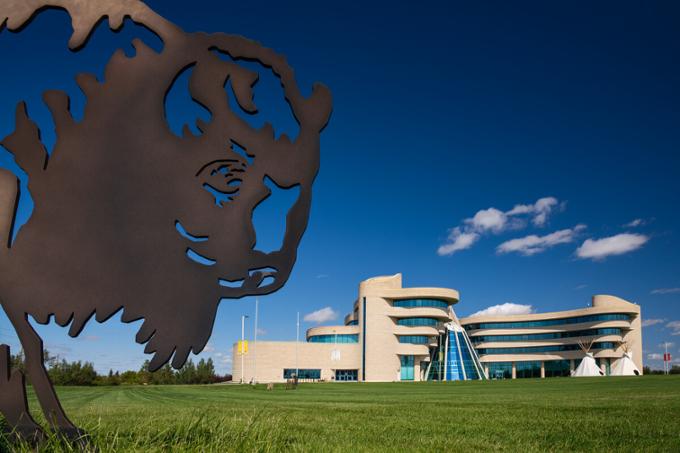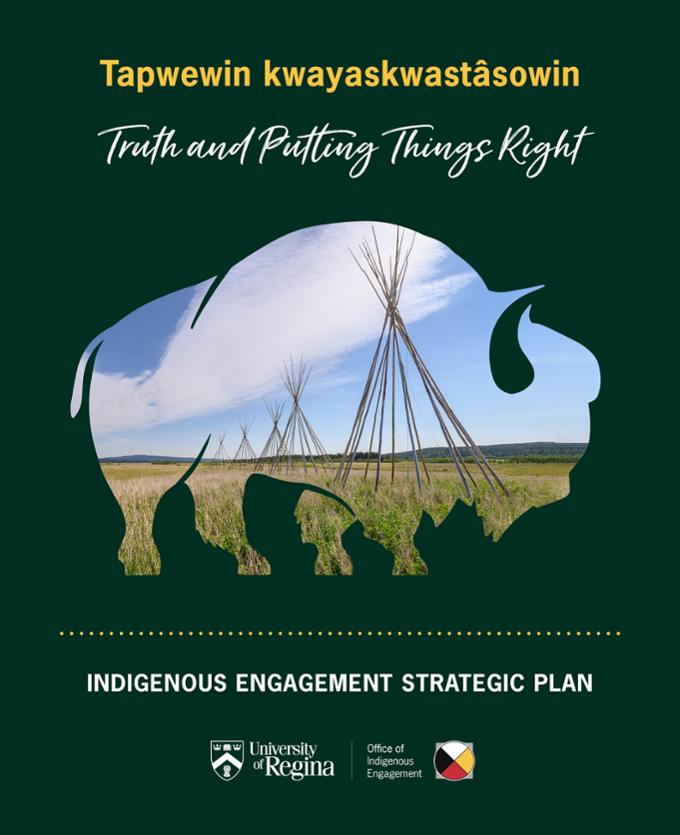
Indigenous Engagement Strategic Plan
Tapwewin kwayaskwastâsowin
Nations across Treaty 4, and Treaty 6 territories have various ways of describing Truth and Reconciliation. While no single word exists for Reconciliation, Tapwewin kwayaskwastâsowin, is nêhiyawak (Cree) language for Truth and putting things right. At the University of Regina, we are committed to advancing Truth and Reconciliation, and Tapwewin kwayaskwastâsowin, the Indigenous Engagement Strategic Plan will guide us on our journey.
Aligning with our 2022-2025 Strategic Plan, kahkiyaw kiwâhkômâkaninawak, All our Relations, this plan is visionary multi-year initiative and significant milestone in the University’s commitment to creating a more inclusive and culturally affirming learning environment for all. Building on our legacy as a leader in supporting and advancing Indigenous education, research, and community collaboration, we are taking action to implement 34 actions. These four actions mentioned below aim to empower Indigenous students, staff, and faculty in all areas across the University campus, breaking down barriers, and strengthening our relationships with First Nations University of Canada and communities in Treaty 4, Treaty 6, Métis Nations and beyond.
The University continues to remain committed to listening and collaborating with Indigenous students, faculty and communities. The creation of this plan reflects the input, voices and lived experiences from various Indigenous and non-Indigenous students, staff, faculty from across the University of Regina, First Nations University of Canada and our federated colleges and Treaty 4, Treaty 6 communities and Métis Nations. For more information on the consultation and engagement visit, please visit our legacy page.
Learn more about the Office of Indigenous Engagement here.
Student Success
Representation and the value of diverse voices within our university community is important in creating a safe and welcoming environment. Improving supports for Indigenous students, staff and faculty is crucial to ensure success of First Nations, Métis and Inuit peoples and foster stronger relationships between the University of Regina and Indigenous communities in which it serves.
By taking the specific actions outlined, the University will enhance student success, promote cultural affirming practices, and create opportunities to advance Indigenous knowledge and success for everyone at the University.

Improve supports for Indigenous students, faculty and staff
- Increase Indigenous faculty, representative leadership, and workforce.
- Commit to a stable and diverse presence of Elders and Knowledge Keepers.
- Support and encourage opportunities for respectful ceremonial participation for all learners.
- Create opportunities and enhance student success by increasing availability of academic and student supports that are relevant, culturally affirming, and innovative.
- Explore and create an Indigenous identity policy with Indigenous leaders, faculty, staff, and community to limit Indigenous fraud and further identity harms.
- Review admissions policies and practices to ensure Indigenous students can access post- secondary education.
- Continue to promote and uphold the University’s commitments to the Jay Treaty to ensure Indigenous students can pursue academic endeavours.
- Expand Indigenous-specific student services, programs and supports such as counseling, mentoring, peer support networks and academic supports tailored to the needs of Indigenous students and staff.
- Invest in Indigenous student recruitment at the same level as international students.
- Offer more Indigenous-specific programs, scholarships, and financial supports across the university.
- Actively promote existing and expanded services, including services at First Nations University of Canada, to Indigenous communities and prospective students to establish the university as a leader in Indigenous education and attract more Indigenous students.
- Hire more Indigenous faculty members and staff to better reflect the diversity of the student body and create a more inclusive and welcoming environment for all Indigenous students.
Spaces and Places
The University of Regina is a community institution that is committed to creating an environment where all individuals feel valued, respected, welcomed, safe and included. We have the honour of teaching, learning, and living on Treaty 4, and 6 Territory, home of many First Nation and Métis people, and we understand the importance and responsibility of acknowledging and recognizing this privilege.
We are committed to creating and fostering spaces and places that support Indigenous students, staff and faculty to connect with culture, and strengthen our relationships with community.

Promote and facilitate welcoming and inclusive cultural spaces
- Work with local First Nation and Métis communities to plan, develop and build cultural spaces and ceremonial places as appropriate on campus and surrounding territory.
- Encourage diversity in architectural and infrastructure/landscape planning building and design.
- Raise Treaty 4, Treaty 6 and Métis flags on the university grounds and in Indigenous spaces to honour and represent the Indigenous peoples served on the campus.
- Create cultural spaces and supports for Indigenous students and staff to promote culture, traditions and community connections for Indigenous students and staff.
- Secure stable ongoing funding opportunities and commit to supporting Indigenous spaces, such as the ta-tawâw Student Centre and the Gabriel Dumont Institute, to ensure and advance Indigenous learning and cultural connections.
- Review and explore affordable housing, transportation and infrastructure needs for Indigenous students.
- Honour Indigenous languages with prominent and fixed acknowledgements on University signage across the campus.
Learning and Teaching
Establishing the University as a leader in Indigenous education and research requires commitment and actions that contribute to a more inclusive, diverse, and supportive learning environment. The University of Regina will advance Truth and Reconciliation by taking action to build stronger relationships with Indigenous communities, collaborating on education and research, and incorporating Indigenous ways of knowing into teaching and research.
Our relationship with First Nations University of Canada is vital to improving Indigenous learning and teaching at the University of Regina. Through the actions outlined, the U of R is committed to supportng First Nations University of Canada to grow and lead the institution in the development of Indigenous-focused academic programs and initiatives.
The University will transform its approach to teaching and research by incorporating and teaching from Indigenous worldviews. By emphasizing Indigenous values, such as respect, reciprocity, and relationship-building, students and the larger community will have more respect and better understanding of Indigenous worldviews and ways of knowing.

Incorporating Indigenous ways of knowing into teaching and research
- Continue to implement and respond to the University of Regina’s “Statement of Commitment in Response to the Truth and Reconciliation Commission (TRC)”. The goals outlined in the “Guide to TRC’s Calls to Action at the University of Regina” specify that students, staff, and faculty have: a knowledge of treaties; an understanding of Canada’s history; an awareness of Indigenous ways of knowing; knowledge of the TRC’s Final Report, the Royal Commission on Aboriginal Peoples and the UN Declaration of the Right of Indigenous Peoples; and an understanding of the role they can play in reconciliation.
- Provide supports and training for respectful and meaningful integration of Indigenous ways of knowing into courses and community outreach activities.
- Build and strengthen our relationships with urban, rural, and remote Indigenous communities with an aim of accountable and reciprocal research.
- Enhance Indigenous engagement in the research enterprise.
- Ensure more U of R students, faculty, and staff complete the Four Seasons of Reconciliation program.
- Enhance professional development opportunities and supports for units and faculties to develop cultural competency and to decolonize pedagogy, curriculums, policies, procedures, and processes.
- Support First Nations University of Canada to develop more Indigenous-focused academic programs such as courses in Indigenous studies, Indigenous languages, and Indigenous health.
- Review all University policies, such as admissions, human resources, employment, research, governance polices, in relation to the Truth and Reconciliation Commission of Canada Calls to Action.
- Partner with Indigenous organizations and communities to develop research projects and programs that are focused on Indigenous issues and community priorities and grounded in Indigenous knowledge and values.
- Support Indigenous language revitalization by partnering with First Nations University of Canada, and local Indigenous language organizations and offering language classes.
- Prioritize Indigenous recruitment in job postings by including language that highlights its commitment to Indigenous representation and encouraging Indigenous applicants to apply.
- Create a welcoming and supportive workplace culture that encourages Indigenous staff to feel valued and supported by providing cultural training, mentorship programs, and support for Indigenous staff to connect with their communities.
- Incorporate and embed Indigenous perspectives and knowledge into curriculums across all disciplines to promote an understanding and appreciation of Indigenous culture and history.
- Increase investment in Indigenous research across the University of Regina and First Nations University of Canada to contribute to the advancement of Indigenous knowledge and support Indigenous communities.
- Create opportunities, such as cultural sensitivity training, for all learners, staff, and faculty to learn Indigenous ways of knowing and being, better understand Indigenous issues and decolonize pedagogy, curriculums, policies, procedures, and processes.
- Enhance professional development programs for Indigenous staff to support and provide guidance and opportunities for professional and personal growth.
Building Community
Building and strengthening relationships with Indigenous communities through respectful and meaningful engagement will contribute to the advancement of learning and well-being for the University and communities. The University has a unique and important relationship with the First Nations University of Canada. We are partners in advancing Indigenous education, collaborating to provide additional opportunities and supports for Indigenous students so they can connect to their culture, build community and succeed academically. We will continue to foster this relationship and build capacity and community through supports, funding and collaboration to ensure current and future students have the opportunity to thrive. The first step in fostering these relationships is acknowledging historical injustices and respecting cultural ceremony and protocols.
The University of Regina is committed to ensuring educational opportunities and experiences are available and accessible across Saskatchewan, including Indigenous communities located in Northern and remote areas. We are committed to working in meaningful collaboration with Indigenous communities to acknowledge, understand and be in service.

Provide educational opportunities and experiences across Saskatchewan
- Commit to continued and expanded Indigenous community connections to build relationships and collaboratively, strategically, and intentionally work together for the best interest of Indigenous students and their communities.
- Continue to build and strengthen relationships with Indigenous communities that facilitate accountable education and research.
- Increase number of collaborative projects with tribal councils, reconciliation coalitions, governments, and Indigenous communities to align education and research-based needs with the University of Regina and First Nations University of Canada, provincially and nationally.
- Evaluate distance and distributed learning opportunities and technologies to enhance flexible learning options for students.
- Build and strengthen relationships with First Nations University of Canada, Gabriel Dumont Institute, Saskatchewan Indian Institute of Technologies, satellite campuses, and regional colleges.
- Develop and implement general principles for engagement with Indigenous peoples and communities that are accessible and understood by the University community.
- Foster stronger relationships and collaboration for resource and research sharing networks with First Nations University of Canada.
- Create an accountability framework to measure University performance and implementation of the Indigenous Engagement Strategic Plan.
- Acknowledge and address historical and ongoing injustices faced by Indigenous peoples to repair the harm caused, offer support and resources for Indigenous students and communities affected by these injustices, and commit to ongoing efforts towards reconciliation and decolonization.
- Increase Indigenous representation in leadership and decision-making roles to ensure that Indigenous perspectives and voices are represented and valued in the University’s decision-making processes.
- Communicate broadly about the University’s commitment to Indigenous engagement, recruitment, and retention, and to highlight the successes and achievements of Indigenous students and faculty.
- Establish partnerships, such as research, education, economic, environmental, and cultural with First Nations University of Canada, Indigenous communities and organizations to develop joint initiatives and programs that will support Indigenous education, engagement, and decolonizing pedagogy.
- Provide meaningful consultation and collaboration with Indigenous communities to seek input and feedback on decisions on community projects, university policies and initiative that affect them.
- Strengthen the institution’s commitment to Indigenous initiatives through the allocation of resources, partnerships with Indigenous communities and organizations, and the integration of Indigenous perspectives and knowledge across the curriculum and institutional practices.
- Build relationships with Indigenous leaders and communities to create outreach, networking, and recruitment opportunities and increase awareness of the university’s offerings.
- Increase communications by developing materials tailored to Indigenous audiences and use various channels to reach Indigenous students and staff, such as social media, targeted advertising, and email campaigns.
